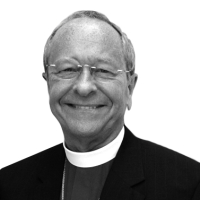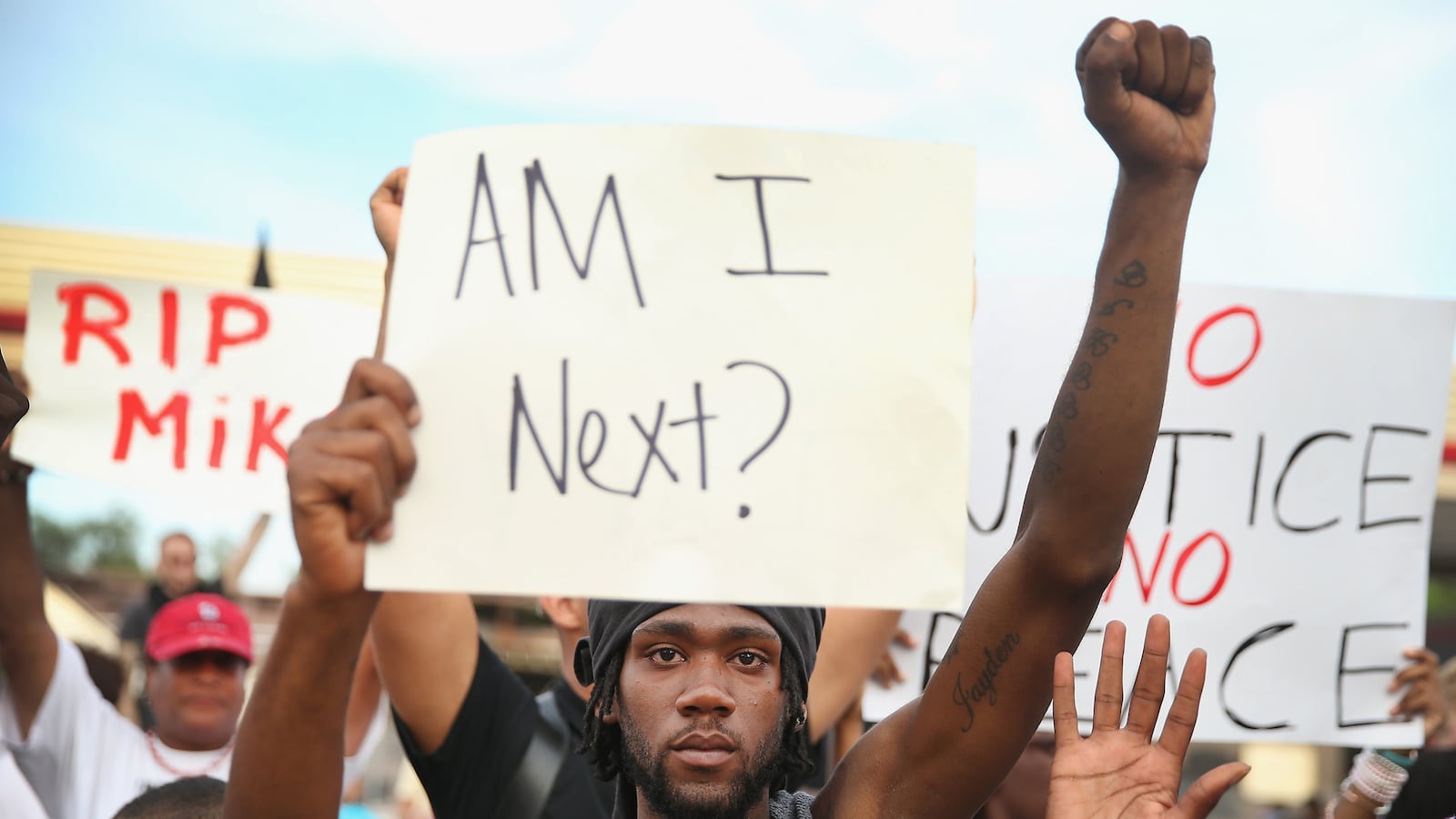My younger daughter is dating a wonderful man, who happens to be black. He’s tall and lean, with handsome dreadlocks hanging down to the backs of his knees. He has a smile that lights up any room, an easy and comfortable way of going about who he is. And his spirit is gentle and kind. He just might (I know, parents are supposed to stay out of these things) become my son-in-law one day. And I fear for his life.
Killings and shootings of young black men by police officers, for little or no reason, has been going on for a very long time. But because of the tragic killing of Michael Brown in Ferguson, Missouri, the wider culture has finally begun to notice what happens to young, black men at the hands of those whose duty it is to protect them.
Two recently released videotapes have shown us what racism is and how it pervades the experience of people of color—and, it seems, especially for young African American men. In an Ohio Wal-Mart, John Crawford III was strolling around the store and had picked up an air rifle that was for sale there. Someone called 911 and reported that he was walking around with a real gun, menacingly waving it around and even pointing it at adults and children, possibly even loading the gun at one point.
Upon the arrival of the police, they rush at the young man. Within two or three seconds have shot him, and he dies from his wounds. The finally released Walmart security video shows this young man doing none of the things reported in the 911 call. Yes, he is carrying a gun (Ohio even has an open-carry law)—but it’s a toy, and taken right from the shelves of the toy department. Mostly he was on his cell phone while walking through the pet supplies area of the store. He is clearly not threatening anyone, and other shoppers are passing this young man with no apparent alarm.
And now he’s dead.
Did he run when the police began to shout and rush toward him? Of course he did, probably having been wisely instructed by his African American parents that the police are not his friend. White parents instruct their children to turn to police when in need of help; black parents are more apt to tell their children that they will be in need of help when the police show up.
Almost more frightening, although it fortunately did not end in death, was the confrontation another young black man, Lavar Jones, had with a police officer in a South Carolina convenience store parking lot. The dash-cam catches it all. Jones is accosted as he gets out of his truck because the policeman has noticed he does not have his seatbelt on (which he says he removed as he was pulling into the parking lot—something I do all the time). The angry voice of the policeman can be heard telling him to produce his driver’s license, which he turns to retrieve from the cab of his truck—only to be shot by the policeman. He moves away, with his arms held high in the air, asking “Why did you shoot me?!”
And the policeman’s response? Three more shots fired at the young man. Fortunately, this cop had bad aim, and the shots did not kill him. And then, heartbreakingly, we hear the young man apologizing (undoubtedly instructed by his parents to be polite and compliant in any confrontation with the police), and trying to explain that he was only doing what the officer had asked him to do. To their credit, the police force immediately fired this cop and charged him with aggravated assault—but too late to change this young man’s experience of what “justice for all” looks like in America.
In an interview with MSNBC’s Chris Hayes, this young man’s attorney startlingly reveals that not only was this young man transported to the hospital in handcuffs, but it was not until nearly midnight (some 8 hours later!) that a policeman “remembered” that he had left Mr. Jones in handcuffs at the hospital and returned to set him free. All because he wasn’t wearing a seat belt. But then again, he was black.
We live in two Americas, where white people are presumed innocent until proven guilty, and black people the opposite. Black people, especially young black men, are regarded as suspicious, threatening and potentially dangerous. And God forbid that their actions in the heat of the moment might remotely look more suspicious, like reaching for one’s wallet. The speed with which these confrontations escalate into gunfire takes one’s breath away.
Even the President of the United States reports that he has heard the click of car doors being locked when, prior to his being President, he walked by a white driver. In a response to these recent shootings, he has spoken of the “crime” of “driving while black” and “walking while black.” And speaking of the President, am I the only one who sees a connection between these attitudes toward African Americans and the fact that this president has received three times the number of death threats than any other president? Has any other president had his political opponents meeting on the night of his inauguration and plotting to block anything—anything!—he proposes, in order to bring him down?
It seems to me that one only barely has to scratch the surface of the vitriol and passion against this particular president to find the ugly and historic hatred (and fear) of African Americans in this country. President Obama isn’t “playing the race card.” I am. And I’m as white and Anglo-Saxon as they come.
White Americans are likely not to even notice the difference in how they are treated versus their African American fellow citizens. And when such a difference gets highlighted, as it has been by these recent events, white people are apt to respond defensively and deny what is plainly evident. But for African Americans, this reality of discrimination is literally a matter of life and death.
I am afraid that when my daughter’s boyfriend goes out for a quart of milk, he may not come back. When he reacts in a way similar to everyone else, it may be perceived as threatening and dangerous, because of the color of his skin. This has to change. These young black men are our children too. And America belongs to them as well as to our white children.
This is personal for me. And it ought to be personal for every one of us.
The Rt. Rev. V. Gene Robinson is a Senior Fellow at the Center for American Progress, Washington, DC. He retired in 2013 as the IX Episcopal Bishop of New Hampshire. Follow him on Twitter @BishopGRobinson.






